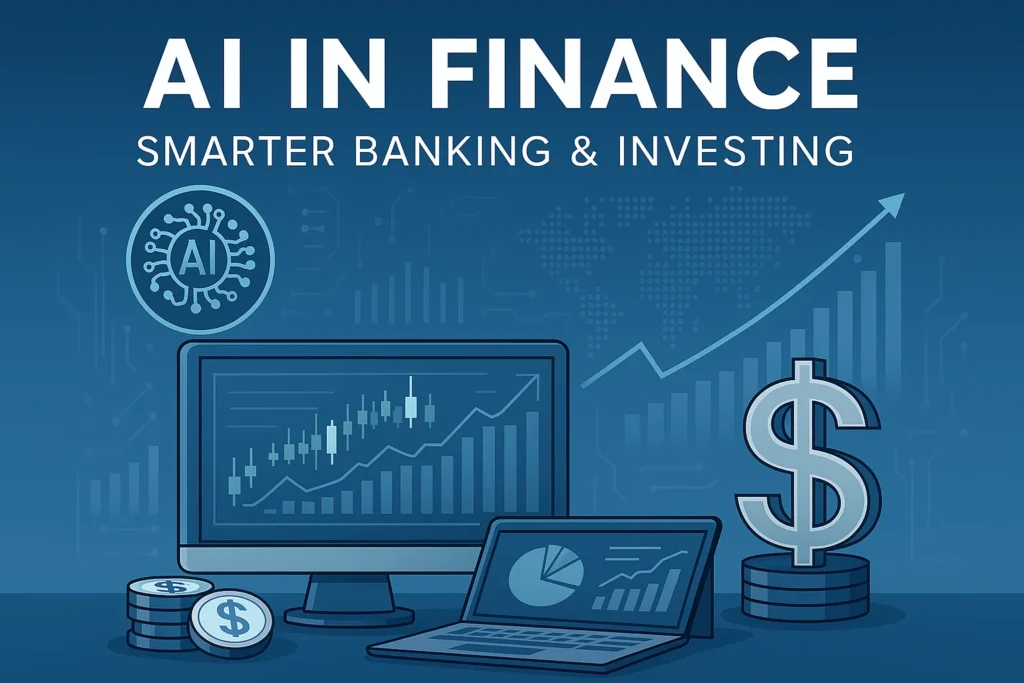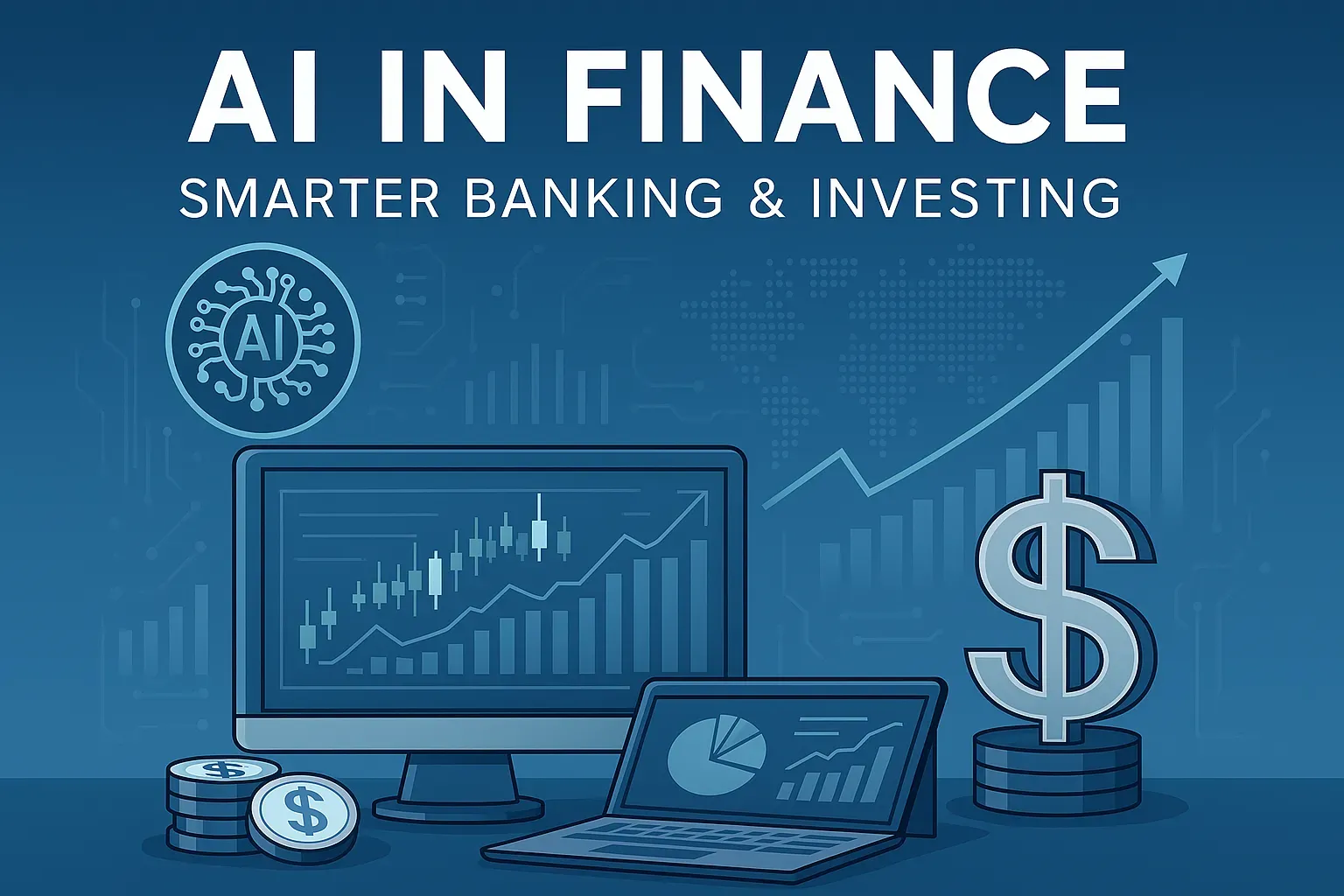🧠 Introduction: Why AI in Finance Is Reshaping U.S. Money Management
In 2025, AI in finance is no longer a buzzword—it’s a game-changing force across the U.S. financial ecosystem. From Wall Street firms to everyday budgeting apps, artificial intelligence is driving smarter decisions, faster transactions, and more secure systems.

Whether you’re a CFO optimizing forecasts, an investor seeking data-driven insights, or a consumer managing your budget, understanding how AI is transforming banking and investing is essential. This post explores the most impactful applications, tools, and trends in AI-powered finance today.
🏦 AI in Banking: Smarter Operations, Safer Transactions
🔍 Real-Time Fraud Detection
Banks like JPMorgan Chase and Wells Fargo use AI to monitor millions of transactions per second, instantly flagging anomalies. These systems reduce fraud losses and improve customer trust.
🤖 AI Chatbots & Virtual Assistants
- Bank of America’s Erica handles over 1 billion interactions annually.
- AI bots answer queries, guide users through transactions, and even offer financial advice.
💳 Loan Underwriting & Credit Scoring
AI models assess creditworthiness using alternative data—like utility payments or social signals—making lending more inclusive and accurate.
📈 AI in Investing: Smarter Portfolios for All (AI in Finance)
🧠 Robo-Advisors & Predictive Analytics
Platforms like Betterment, Wealthfront, and Schwab Intelligent Portfolios use AI to:
- Optimize asset allocation
- Rebalance portfolios
- Forecast market trends
📊 Institutional Use Cases (AI in Finance)
Hedge funds and asset managers deploy AI for:
- Sentiment analysis from news and social media
- High-frequency trading algorithms
- Risk modeling and scenario planning
🧮 AI for CFOs & Financial Planning: Precision at Scale
📅 Forecasting & Budgeting
Tools like Microsoft Copilot in Excel allow CFOs to:
- Generate forecasts from historical data
- Simulate multiple budget scenarios
- Automate variance analysis
🧾 Compliance & RegTech (AI in Finance)
AI helps navigate complex regulations:
- Automates audit trails
- Flags non-compliant transactions
- Ensures real-time reporting accuracy
💰 AI in Consumer Finance: Empowering Everyday Users
📱 Personal Finance Apps (AI in Finance)
Apps like Mint, YNAB, and Copilot Money use AI to:
- Categorize spending
- Predict future expenses
- Offer savings recommendations
🛍️ BNPL & Credit Risk Assessment
Buy Now, Pay Later platforms (e.g., Affirm, Klarna) use AI to evaluate repayment risk instantly—without traditional credit checks.
🧾 Tax Filing & Budgeting Tools (AI in Finance)
AI-powered platforms like TurboTax and H&R Block simplify tax prep by auto-filling forms and flagging deductions.
⚖️ Regulation & Ethics: Responsible AI in Finance
🏛️ U.S. Regulatory Landscape
Agencies like the SEC, FTC, and CFPB are:
- Drafting AI transparency guidelines
- Investigating bias in lending algorithms
- Promoting ethical AI deployment
🧠 Bias Mitigation & Model Explainability
Financial institutions are investing in:
- Fairness audits
- Transparent AI models
- Inclusive data sets
🔮 Future of AI in Finance: What’s Next?
🤖 Autonomous AI Agents
AI agents will soon:
- Handle multi-step financial tasks
- Schedule payments
- Generate reports across platforms
🌱 ESG & Climate Risk Modeling
AI is helping firms:
- Assess environmental impact
- Align portfolios with sustainability goals
🔗 Blockchain + AI Integration
Combining AI with blockchain enables:
- Secure identity verification
- Smart contract automation
- Decentralized finance (DeFi) innovation
✅ Actionable Takeaways for Every Audience
| Audience | What You Should Do |
|---|---|
| CFOs | Adopt AI tools for forecasting, compliance, and reporting |
| Investors | Use AI platforms for portfolio optimization and risk analysis |
| Consumers | Try AI-powered budgeting and credit apps for smarter money management |
| Fintechs | Focus on ethical AI and regulatory alignment to build trust |
❓ Frequently Asked Questions
Q1: How is AI used in U.S. banking today?
AI is used for fraud detection, customer service chatbots, loan underwriting, and real-time transaction monitoring.
Q2: Are robo-advisors safe for investing?
Yes, robo-advisors use regulated algorithms and offer diversified portfolios, often with lower fees than traditional advisors.
Q3: Can AI help with personal budgeting?
Absolutely. Apps like Mint and Copilot Money use AI to track spending, predict expenses, and suggest savings strategies.
Q4: What are the risks of AI in finance?
Risks include data bias, lack of transparency, and regulatory challenges. Responsible AI frameworks are essential.
Q5: Will AI replace financial advisors?
Not entirely. AI enhances decision-making, but human advisors offer personalized guidance and emotional intelligence.
🧭 Conclusion: Embrace the Revolution of AI in Finance
AI in finance is not just a trend—it’s a transformation. In 2025, U.S. financial services are becoming faster, smarter, and more inclusive thanks to artificial intelligence. Whether you’re managing billions or budgeting hundreds, AI offers tools to make better decisions, reduce risk, and unlock new opportunities.
As this technology continues to evolve, staying informed and proactive is key. Embrace AI responsibly, and you’ll be ahead of the curve in the future of finance.
Disclaimer
This article relies on internal data, publicly available information, and other reliable sources. It may also include the authors’ personal views. However, it’s essential to note that the information is for general, educational, and awareness purposes only—it doesn’t disclose every material fact. This analysis is for informational purposes only and does not constitute financial advice. Consult a professional before making investment decisions.
We publish information on World Virtual CFO in good faith, solely for general information. World Virtual CFO doesn’t guarantee the completeness, reliability, or accuracy of this information. These are our views for informational purposes. When you use our website, know that any action you take is entirely at your own risk. World Virtual CFO won’t be liable for any losses or damages connected to your use of our website. For detailed information, refer to our disclaimer page.
Dr. Dinesh Sharma is an award-winning CFO and AI strategist with over two decades of experience in financial leadership, digital transformation, and business optimization. As the founder of multiple niche platforms—including WorldVirtualCFO.com—he empowers professionals and organizations with strategic insights, system structuring, and innovative tools for sustainable growth. His blogs and e-books blend precision with vision, making complex financial and technological concepts accessible and actionable.

Comments are closed.